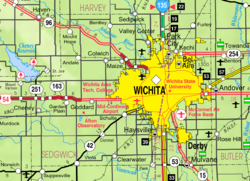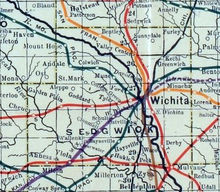Kechi, Kansas
Kechi, Kansas | |
|---|---|
 Location within Sedgwick County and Kansas | |
 | |
| Coordinates: 37°47′43″N 97°16′43″W / 37.79528°N 97.27861°W[1] | |
| Country | United States |
| State | Kansas |
| County | Sedgwick |
| Founded | 1880s |
| Incorporated | 1957 |
| Named for | Kichai people |
| Area | |
• Total | 6.08 sq mi (15.74 km2) |
| • Land | 6.03 sq mi (15.61 km2) |
| • Water | 0.05 sq mi (0.13 km2) |
| Elevation | 1,381 ft (421 m) |
| Population | |
• Total | 2,217 |
| • Density | 360/sq mi (140/km2) |
| Time zone | UTC-6 (CST) |
| • Summer (DST) | UTC-5 (CDT) |
| ZIP code | 67067 |
| Area code | 316 |
| FIPS code | 20-36225[1] |
| GNIS ID | 473859[1] |
| Website | kechiks.gov |
Kechi /ˈkiːtʃaɪ/ is a city in Sedgwick County, Kansas, United States,[1] and a suburb of Wichita. As of the 2020 census, the population of the city was 2,217.[3]
History
[edit]19th century
[edit]
Kechi was named for the Kichai people.[4]
In 1887, the Chicago, Kansas and Nebraska Railway built a branch line north-south from Herington through Kechi to Caldwell.[5] It foreclosed in 1891 and was taken over by Chicago, Rock Island and Pacific Railway, which shut down in 1980 and reorganized as Oklahoma, Kansas and Texas Railroad, merged in 1988 with Missouri Pacific Railroad, merged in 1997 with Union Pacific Railroad. Most locals still refer to this railroad as the "Rock Island".
The first post office in Kechi was established in 1888.[6]
Geography
[edit]Kechi is located at 37°47′43″N 97°16′43″W / 37.795228°N 97.278660°W (37.795228, -97.278660).[7] According to the United States Census Bureau, the city has a total area of 6.02 square miles (15.59 km2), of which, 5.97 square miles (15.46 km2) is land and 0.05 square miles (0.13 km2) is water.[8]
Demographics
[edit]| Census | Pop. | Note | %± |
|---|---|---|---|
| 1960 | 245 | — | |
| 1970 | 229 | −6.5% | |
| 1980 | 288 | 25.8% | |
| 1990 | 517 | 79.5% | |
| 2000 | 1,038 | 100.8% | |
| 2010 | 1,909 | 83.9% | |
| 2020 | 2,217 | 16.1% | |
| U.S. Decennial Census | |||
Kechi is part of the Wichita, KS Metropolitan Statistical Area.
2020 census
[edit]The 2020 United States census counted 2,217 people, 840 households, and 661 families in Kechi.[9][10] The population density was 367.9 per square mile (142.0/km2). There were 871 housing units at an average density of 144.5 per square mile (55.8/km2).[10][11] The racial makeup was 82.95% (1,839) white or European American (80.97% non-Hispanic white), 4.56% (101) black or African-American, 0.99% (22) Native American or Alaska Native, 2.03% (45) Asian, 0.05% (1) Pacific Islander or Native Hawaiian, 2.48% (55) from other races, and 6.95% (154) from two or more races.[12] Hispanic or Latino of any race was 5.91% (131) of the population.[13]
Of the 840 households, 33.2% had children under the age of 18; 67.3% were married couples living together; 16.7% had a female householder with no spouse or partner present. 15.7% of households consisted of individuals and 8.6% had someone living alone who was 65 years of age or older.[10] The average household size was 3.1 and the average family size was 3.4.[14] The percent of those with a bachelor’s degree or higher was estimated to be 35.0% of the population.[15]
22.2% of the population was under the age of 18, 8.3% from 18 to 24, 23.4% from 25 to 44, 29.3% from 45 to 64, and 16.9% who were 65 years of age or older. The median age was 41.2 years. For every 100 females, there were 103.8 males.[10] For every 100 females ages 18 and older, there were 103.5 males.[10]
The 2016-2020 5-year American Community Survey estimates show that the median household income was $100,069 (with a margin of error of +/- $6,154) and the median family income was $103,854 (+/- $5,773).[16] Males had a median income of $59,268 (+/- $8,204) versus $28,571 (+/- $3,892) for females. The median income for those above 16 years old was $42,955 (+/- $7,572).[17] Approximately, 2.9% of families and 2.9% of the population were below the poverty line, including 1.1% of those under the age of 18 and 7.5% of those ages 65 or over.[18][19]
2010 census
[edit]As of the census[20] of 2010, there were 1,909 people, 701 households, and 566 families living in the city. The population density was 319.8 inhabitants per square mile (123.5/km2). There were 732 housing units at an average density of 122.6 per square mile (47.3/km2). The racial makeup of the city was 87.7% White, 5.5% African American, 0.9% Native American, 2.0% Asian, 1.2% from other races, and 2.8% from two or more races. Hispanic or Latino of any race were 3.1% of the population.
There were 701 households, of which 33.2% had children under the age of 18 living with them, 73.0% were married couples living together, 5.6% had a female householder with no husband present, 2.1% had a male householder with no wife present, and 19.3% were non-families. 15.5% of all households were made up of individuals, and 4.6% had someone living alone who was 65 years of age or older. The average household size was 2.72 and the average family size was 3.06.
The median age in the city was 42.6 years. 24.6% of residents were under the age of 18; 6.1% were between the ages of 18 and 24; 22.7% were from 25 to 44; 36% were from 45 to 64; and 10.7% were 65 years of age or older. The gender makeup of the city was 49.7% male and 50.3% female.
2000 census
[edit]As of the census[21] of 2000, there were 1,038 people, 354 households, and 301 families living in the city. The population density was 785.0 inhabitants per square mile (303.1/km2). There were 370 housing units at an average density of 279.8 per square mile (108.0/km2). The racial makeup of the city was 87.67% White, 7.71% African American, 0.67% Native American, 0.58% Asian, 0.10% Pacific Islander, 0.19% from other races, and 3.08% from two or more races. Hispanic or Latino of any race were 2.12% of the population.
There were 354 households, out of which 45.8% had children under the age of 18 living with them, 77.4% were married couples living together, 5.4% had a female householder with no husband present, and 14.7% were non-families. 12.1% of all households were made up of individuals, and 2.3% had someone living alone who was 65 years of age or older. The average household size was 2.93 and the average family size was 3.19.
In the city, the population was spread out, with 31.1% under the age of 18, 6.3% from 18 to 24, 35.8% from 25 to 44, 22.2% from 45 to 64, and 4.6% who were 65 years of age or older. The median age was 33 years. For every 100 females, there were 100.0 males. For every 100 females age 18 and over, there were 98.1 males.
The median income for a household in the city was $61,333, and the median income for a family was $62,212. Males had a median income of $43,393 versus $28,077 for females. The per capita income for the city was $22,444. About 2.5% of families and 2.5% of the population were below the poverty line, including 4.4% of those under age 18 and 4.7% of those age 65 or over.
Education
[edit]The city is served by Wichita USD 259 and Valley Center USD 262 public school districts.
References
[edit]- ^ a b c d e "Kechi, Kansas", Geographic Names Information System, United States Geological Survey, United States Department of the Interior
- ^ "2019 U.S. Gazetteer Files". United States Census Bureau. Retrieved July 24, 2020.
- ^ a b "Profile of Kechi, Kansas in 2020". United States Census Bureau. Archived from the original on November 15, 2021. Retrieved November 14, 2021.
- ^ "City History". City of Kechi, Kansas. Archived from the original on November 9, 2014. Retrieved June 12, 2014.
- ^ "Rock Island Rail History". Archived from the original on June 19, 2011. Retrieved April 17, 2011.
- ^ "Kansas Post Offices, 1828-1961". Kansas Historical Society. Archived from the original on October 9, 2013. Retrieved June 10, 2014.
- ^ "US Gazetteer files: 2010, 2000, and 1990". United States Census Bureau. February 12, 2011. Retrieved April 23, 2011.
- ^ "US Gazetteer files 2010". United States Census Bureau. Archived from the original on July 2, 2012. Retrieved July 6, 2012.
- ^ "US Census Bureau, Table P16: HOUSEHOLD TYPE". data.census.gov. Retrieved January 3, 2024.
- ^ a b c d e "US Census Bureau, Table DP1: PROFILE OF GENERAL POPULATION AND HOUSING CHARACTERISTICS". data.census.gov. Retrieved January 3, 2024.
- ^ Bureau, US Census. "Gazetteer Files". Census.gov. Retrieved December 30, 2023.
{{cite web}}:|last=has generic name (help) - ^ "US Census Bureau, Table P1: RACE". data.census.gov. Retrieved January 3, 2024.
- ^ "US Census Bureau, Table P2: HISPANIC OR LATINO, AND NOT HISPANIC OR LATINO BY RACE". data.census.gov. Retrieved January 3, 2024.
- ^ "US Census Bureau, Table S1101: HOUSEHOLDS AND FAMILIES". data.census.gov. Retrieved January 3, 2024.
- ^ "US Census Bureau, Table S1501: EDUCATIONAL ATTAINMENT". data.census.gov. Retrieved January 3, 2024.
- ^ "US Census Bureau, Table S1903: MEDIAN INCOME IN THE PAST 12 MONTHS (IN 2020 INFLATION-ADJUSTED DOLLARS)". data.census.gov. Retrieved January 3, 2024.
- ^ "US Census Bureau, Table S2001: EARNINGS IN THE PAST 12 MONTHS (IN 2020 INFLATION-ADJUSTED DOLLARS)". data.census.gov. Retrieved January 3, 2024.
- ^ "US Census Bureau, Table S1701: POVERTY STATUS IN THE PAST 12 MONTHS". data.census.gov. Retrieved January 3, 2024.
- ^ "US Census Bureau, Table S1702: POVERTY STATUS IN THE PAST 12 MONTHS OF FAMILIES". data.census.gov. Retrieved January 3, 2024.
- ^ "U.S. Census website". United States Census Bureau. Retrieved July 6, 2012.
- ^ "U.S. Census website". United States Census Bureau. Retrieved January 31, 2008.

